May 19, 2024 | 20:03 GMT +7
May 19, 2024 | 20:03 GMT +7
Hotline: 0913.378.918
May 19, 2024 | 20:03 GMT +7
Hotline: 0913.378.918
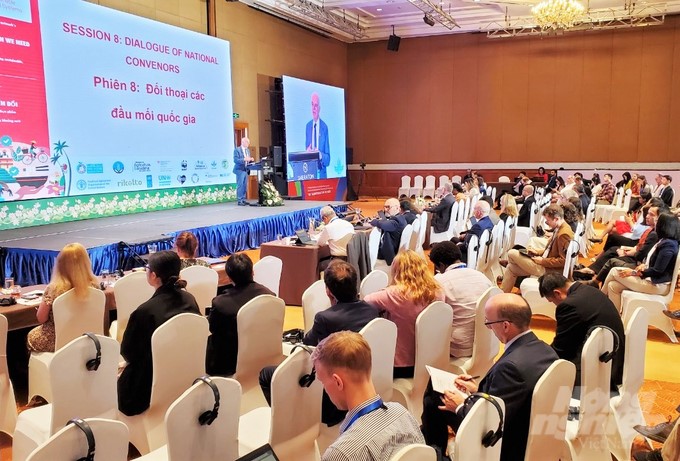
The 8th session emphasized the national convenors’ role of connecting and leading the implementation of action plans. Photo: Tung Dinh.
At the 8th discussion session, Ms. Sylvia Ekra, Deputy Director of the Food System Coordination Center and moderator of this session, said, "This dialogue session will focus on specific dialogue with representatives of countries. The reason is that to operate the food system effectively, it is first important for countries to have a convenor to implement activities."
Representatives of countries will act as "conductors," leading the path of implementing activities to build food systems in their countries, providing intervention and influence for domestic ministries and branches to connect, support, and agree with the common goal. Thereby, activities will be implemented effectively, contributing to the countries’ achievement of their goals and vision.
Mr. Alwin Kopse from Switzerland Agriculture Office, also shared about his experiences on developing his country's citizen council. Switzerland has advocacy groups and the Referendum Institute to collect people's opinions on important issues in the country, such as amending the constitution. This is also a dialogue channel to get opinions on developing and ensuring food safety.
Through these channels, in the past, 5–6 initiatives related to food have been implemented effectively. However, in the process of operating these organizations, there are still fierce arguments between communities in rural and urban areas.
The citizen council can be regarded as a bridge between rural and urban areas. The council is set up and operated according to a strict process. In which approximately 80 young people will be selected, representing different ages, professions, living environments, etc. This council will create an open space to exchange ideas, debate with each other, and take initiatives. Such initiatives must have a scientific basis and be rigorously analyzed based on convincing practical evidence. From there, point out what needs to be recommended to build an effective food system. There is thus no longer a distinction between production in rural and urban areas.
However, this council can work effectively only when everyone has confidence in their discussion ability. In addition, the implementation steps must be transparent to convince people. This group will make recommendations to the government for the government to consider and then give specific feedback for each recommendation as to whether it can be implemented or not.
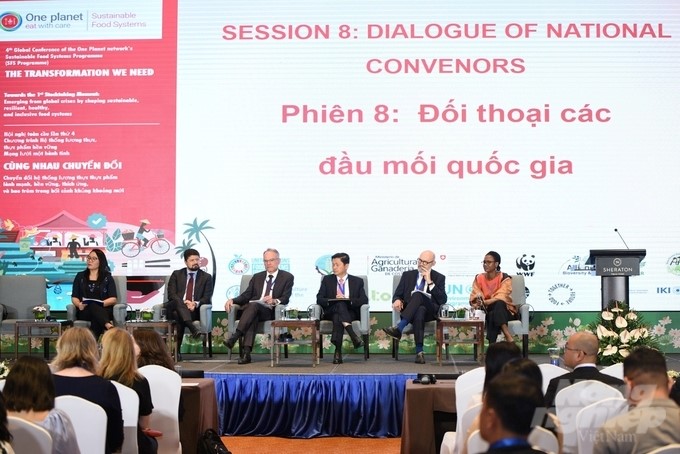
The representatives of some countries’ convenors share experiences in building the food system. Photo: Tung Dinh.
Assoc. Truong Tuyet Mai, Deputy Director of the National Institute of Nutrition, Ministry of Health, Vietnam, shared about Vietnam's experience and orientation in developing a sustainable food system. Accordingly, Vietnam has always identified the transformation and building of a sustainable food system as today's urgent tasks. The fact that Vietnam is the host of the 4th Food Conference is the clearest proof of its active participation, demonstrating Vietnam's responsibility for its commitments to the world community.
Deputy Director Truong Tuyet Mai said that in order to build a successful food safety system, the first important thing is strong participation from the government, ministries, sectors, and all localities.
The proof of this message is that on March 28, 2023, the Prime Minister issued Decision No. 300/QD-TTg approving the National Action Plan to transform the transparent, responsible, and sustainable food system in Vietnam by 2030.
Since this document was issued, all relevant ministries, sectors, localities, people, and subjects have taken part together. All 63 provinces and cities, based on a common action framework, will actively develop their own action plans so that all information reaches the commune level and reaches each citizen so that all resources can be mobilized to participate in this activity.
However, it is compulsory to solve the difficulties, such as the lack of information on what a sustainable food system is, resource mobilization for building a food system, and modern technology challenges.
According to Ms. Truong Tuyet Mai, the decisive factor in successfully building a sustainable food safety system is to let people understand, discuss, and implement it. Thereby, each person will voluntarily improve their roles and responsibilities and actively contribute to common actions.
According to Prof. David Nabarro, co-director of the Global Health Innovation Institute, national convenors have done a lot of work to create change in the food system in their countries and communities. Participating in a system plays a role in encouraging people to do better and vice versa, demanding higher skills from them.
According to Prof. David, the goal of sustainable development is the foundation and principle for countries to connect stakeholders together towards a defined goal. Besides, national convenors also use the right of accessing food.
"We cannot achieve the future food goal if we do not consider the people’s full involvement as the center and focus. Those are the key factors and the goal for us to join the food system, and the glue that holds us together," said co-director of the Global Health Innovation Institute.
Second, there should be coordination between sectors such as the environment, health, climate change, etc. The participation of all stakeholders, including smallholders, in the relationship with food, then expanding that relationship to involve other parties.
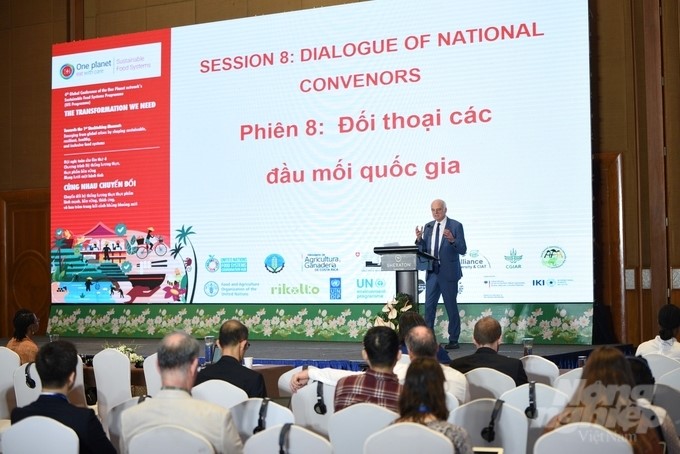
Prof. David Nabarro, co-director of the Global Health Innovation Institute, said that national convenors have done a lot of work to create change in the food system in their countries and communities. Photo: Tung Dinh.
"We must pay attention to all regions, combining short-term and long-term goals; connect with scientists; connect ecosystems to support an adaptive food system because food system transformation is a long-term process. Escalating prices, or climate change all have an impact on the food system. I strongly believe that the national convenors’ role in compiling stakeholders is extremely important. The convenors understand better than anyone else about their own country's problems. They know what they need and how to achieve the national goal. They are the ones driving that method in their country", stated Prof. David.
As a representative of Cambodia’s convenor, Dr. Sok Silo, Secretary General of the Cambodia Council of Agriculture and Rural Development, said, “Cambodia pays attention to and participates in the network of food systems to ensure food security and, from there, increase access to food and nutrition for the people. Cambodia gains benefits from participating in this network of food systems.”
According to Dr. Sok Silo, over the past two years, Cambodia has achieved many important achievements through its commitment to ensuring nutrition for its people, perfecting the operation of the global action plan, formulating a national strategy on food security and ensuring nutrition until 2028. Cambodia is one of the active members of the global network.
The food system is a transparent system that requires the linkages of stakeholders to share and provide information; it needs coordination to eliminate discrete approaches and discrete strategies.
Translated by Huyen Vu
/2024/05/19/5245-3-134735_960.jpg)
(VAN) This is the first time that Ho Chi Minh City has hosted the International Ginseng and Aromatic, Medicinal Herbs Festival, with the participation of many businesses, international delegations, and many provinces and cities.
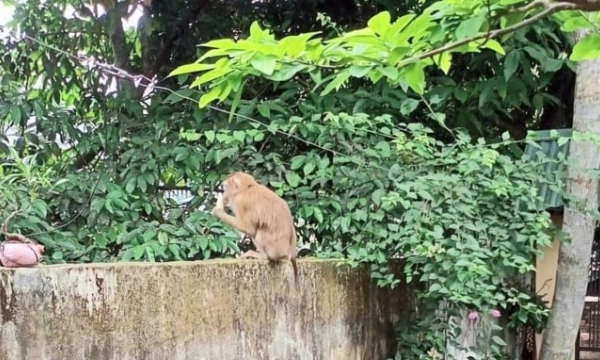
(VAN) In 3 districts in Hai Phong, local authorities have reported the appearance of wild monkeys. They rummaged belongings and damaged trees and crops.

(VAN) Vu Quang National Park can be accurately described as a treasure trove of novel species in Vietnam, given the wide range of unique and uncommon species found there.
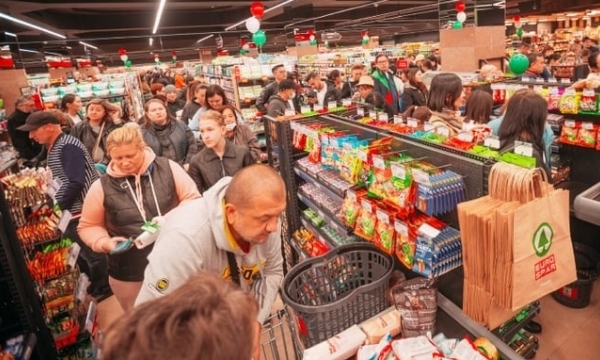
(VAN) Minister of Industry and Trade Nguyen Hong Dien emphasized that the success of foreign businesses in Vietnam is the success of Vietnam, and vice versa.
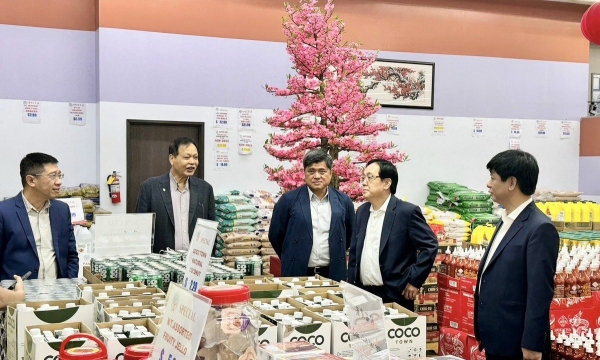
(VAN) A delegation from MARD led by Deputy Minister Tran Thanh Nam, visited California, USA to facilitate the trading of agro-forestry-fishery products and establish connections with the consumption market.
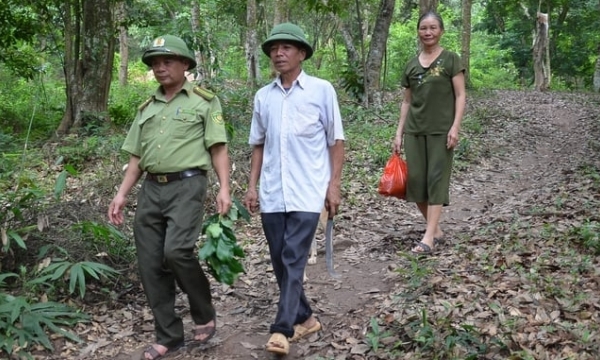
(VAN) This is a component in the project for 'Developing the multi-purpose value of the forest ecosystem in Bac Giang province until 2030, with a vision towards 2050'.
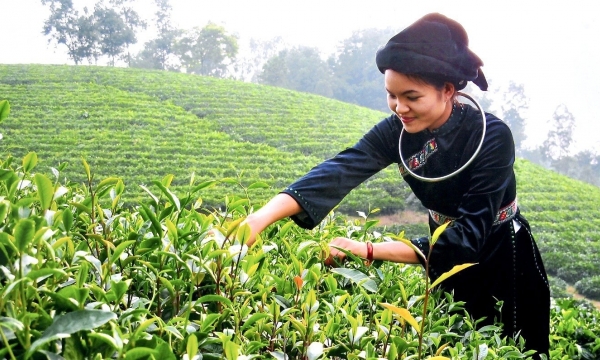
(VAN) As many as 9 typical industrial rural products of the North in 2024 of Thai Nguyen province are notable tea brands.